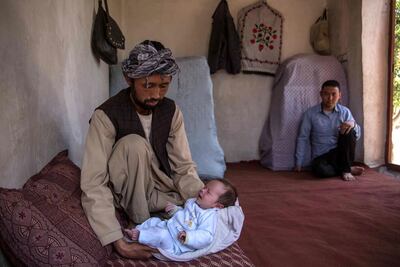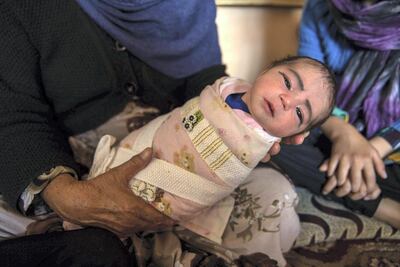It was mid-morning when Ahmed Reza’s phone rang, his wife’s voice on the other end shaky, fearful.
“The hospital was attacked,” Rokaia, 34, whispered from the clinic where she had given birth; her words broken, the sound of gunfire in the background.
Mr Reza’s stomach turned, as, trying to keep his calm, he uttered a few encouraging words. “Find a place to hide, I’m coming there.” She reassured him she’d try and hung up. It was the last time he would ever hear from his wife.
On May 12, gunmen dressed in police uniforms stormed a maternity clinic in western Kabul’s Dasht-e-Barchi neighbourhood, killing 24 people – including newborn babies and 16 mothers who had just given birth – and injuring a further 20.
While no militant group has claimed the attack, the US’s special representative Zalmay Khalilzad blamed ISIS; and Afghanistan’s President Ashraf Ghani ordered his defence forces to take up an “active defensive” position against all militants - including the Taliban.
Less than two weeks after the attack, ahead of the Islamic holiday of Eid Al Fitr, Mr Reza, 34 and now a father of six, says there is nothing to celebrate this year. He sits in the family’s small compound, a single room adjunct to a garden, cradling Abbas, who had been born in the clinic just a few days before the attack.
“He wasn’t strong enough to go home right away, so the doctors kept him and Rokaia at the hospital for several days. At the day of the attack, as soon as I got to the clinic, I tried to push my way in, hoping I could somehow save my family,” Mr Reza admitted quietly.
He brought his wife home that night around iftar time, her lifeless body wrapped in bags and blankets, put to rest on a green hillside overlooking Kabul the next morning.
“At the morgue, they told me that I could take the body home if I could recognise it. It was my first time seeing dead bodies and the image will stay with me forever. They were all mutilated,” he remembered. While he told his older children, who are between seven and 14 years old, what had happened, he wasn’t quite sure how to explain the attack to his two-year-old daughter Fereshta.
“At night, she screams and cries, calling for her mother,” Mr Reza admitted, his voice dropping. “I don’t know what to do. We tell her mum is still at the hospital, and I even make pretend phone calls to my wife to calm Fereshta down. I don’t know how long we can keep it up, but how do you tell a toddler that her mother has been brutally shot?”
Living in a Kabul suburb, the family had enjoyed relative peace. "My wife," Mr Reza said, "has never seen the war before and neither had my children. We've lived a quiet life."
Throughout Afghanistan, violence has picked up over recent weeks, casting doubts on the US-Taliban agreement towards peace, signed in February, and raising concerns about plans for direct negotiations between the Taliban and the Afghan government.
The Taliban’s leader, Haibatullah Akhunzada, said the group remained committed to the deal, urging the US "not to waste" the opportunity to end America’s longest war. Yet attacks throughout the country have peaked, and civilian casualties have risen since the deal was signed.
United Nations figures indicate a trend towards escalating civilian casualties in April from operations conducted by both the Taliban and the Afghan National Security Forces (ANDSF). “There is also grave concern about levels of violence in the first half of May, including recent attacks claimed by Islamic State-Khorasan Province,” their statement said.
Civilian casualties attributed to the Taliban were up by 25 per cent in April compared to last year; while ANDSF civilian casualties were up 38 per cent in the same timeframe.
Agha Gul, a 35-year-old father of five, sits in the living room of his Dasht-e-Barchi home, a photo of his murdered wife already put up on the shelf, the shiny frame squeezed in between the family’s belongings, as if it had been sitting there for a long while. But it is recent and new, just as the pain written on the family’s faces. In the photo, taken a few years ago, Soraya’s head is covered with a black scarf, her expression relaxed and kind.
But it is a more recent image of the 30-year-old mother that had involuntarily made it into the family’s minds; one that Mr Gul had even taken a photo of with his mobile phone, as a sort of proof, a sort of documentation, he said: Soraya riddled with bullets to the head and stomach, severely disfiguring her appearance.
She had been brutally killed in the hospital attack, just hours after giving birth to her daughter Zahra. The newborn survived, evacuated from the hospital by armed uniformed soldiers, carefully carrying the new life.
“I found Soraya at the morgue after searching every possible hospital in the city,” Mr Gul said. “I brought her home so the children could see their mother. The body stayed with us that night and we buried her in the morning. My children have been quiet and in shock; I don’t know what the image did to them.”
Soraya, who gave birth the night before the attack, had been the family’s breadwinner, working in the army’s logistical department. She had gone to her office until just a few weeks before giving birth. “She was independent and strong,” Mr Gul said. “She worked to protect her country and family from terrorists. Now she was killed by them.”
The family’s savings, allocated for Eid Al Fitr celebrations, have been spent on Soraya’s funeral, but anyway, Mr Gul said, there was nothing much to celebrate this year. In recent weeks, there hasn’t been a quiet day in the capital Kabul, with targeted killings and countless smaller explosions interrupting daily life.
Mr Gul’s family sits together quietly in their living room, a small carpeted room with thick cushions, the sound of busy traffic nearby.
Holding his newborn in his arms, Mr Gul sits by the window where warm rays of sunlight enter the room.
“Zahra, my daughter,” he said, kissing her gently. “Now I am both your father and your mother.”
SPEC%20SHEET%3A%20SAMSUNG%20GALAXY%20Z%20FLIP5
%3Cp%3E%3Cstrong%3EDisplay%3A%3C%2Fstrong%3E%20Main%20%E2%80%93%206.7%22%20FHD%2B%20Dynamic%20Amoled%202X%2C%202640%20x%201080%2C%2022%3A9%2C%20425ppi%2C%20HDR10%2B%2C%20up%20to%20120Hz%3B%20cover%20%E2%80%93%203%2F4%22%20Super%20Amoled%2C%20720%20x%20748%2C%20306ppi%3C%2Fp%3E%0A%3Cp%3E%3Cstrong%3EProcessor%3A%3C%2Fstrong%3E%20Qualcomm%20Snapdragon%208%20Gen%202%2C%204nm%2C%20octa-core%3B%20Adreno%20740%20GPU%3C%2Fp%3E%0A%3Cp%3E%3Cstrong%3EMemory%3A%3C%2Fstrong%3E%208GB%3C%2Fp%3E%0A%3Cp%3E%3Cstrong%3ECapacity%3A%3C%2Fstrong%3E%20256%2F512GB%3C%2Fp%3E%0A%3Cp%3E%3Cstrong%3EPlatform%3A%3C%2Fstrong%3E%20Android%2013%2C%20One%20UI%205.1.1%3C%2Fp%3E%0A%3Cp%3E%3Cstrong%3EMain%20camera%3A%3C%2Fstrong%3E%20Dual%2012MP%20ultra-wide%20(f%2F2.2)%20%2B%2012MP%20wide%20(f%2F1.8)%2C%20OIS%3C%2Fp%3E%0A%3Cp%3E%3Cstrong%3EVideo%3A%3C%2Fstrong%3E%204K%4030%2F60fps%2C%20full-HD%4060%2F240fps%2C%20HD%40960fps%3C%2Fp%3E%0A%3Cp%3E%3Cstrong%3EFront%20camera%3A%3C%2Fstrong%3E%2010MP%20(f%2F2.2)%3C%2Fp%3E%0A%3Cp%3E%3Cstrong%3EBattery%3A%3C%2Fstrong%3E%203700mAh%2C%2025W%20fast%20charging%2C%2015W%20wireless%2C%204.5W%20reverse%20wireless%3C%2Fp%3E%0A%3Cp%3E%3Cstrong%3EConnectivity%3A%3C%2Fstrong%3E%205G%3B%20Wi-Fi%2C%20Bluetooth%205.3%2C%20NFC%20(Samsung%20Pay)%3C%2Fp%3E%0A%3Cp%3E%3Cstrong%3EI%2FO%3A%3C%2Fstrong%3E%20USB-C%3C%2Fp%3E%0A%3Cp%3E%3Cstrong%3ECards%3A%3C%2Fstrong%3E%20Nano-SIM%20%2B%20eSIM%3B%20no%20microSD%20slot%3C%2Fp%3E%0A%3Cp%3E%3Cstrong%3EColours%3A%3C%2Fstrong%3E%20Cream%2C%20graphite%2C%20lavender%2C%20mint%3B%20Samsung.com%20exclusives%20%E2%80%93%20blue%2C%20grey%2C%20green%2C%20yellow%3C%2Fp%3E%0A%3Cp%3E%3Cstrong%3EIn%20the%20box%3A%3C%2Fstrong%3E%20Flip%204%2C%20USB-C-to-USB-C%20cable%3C%2Fp%3E%0A%3Cp%3E%3Cstrong%3EPrice%3A%3C%2Fstrong%3E%20Dh3%2C899%20%2F%20Dh4%2C349%3C%2Fp%3E%0A
The candidates
Dr Ayham Ammora, scientist and business executive
Ali Azeem, business leader
Tony Booth, professor of education
Lord Browne, former BP chief executive
Dr Mohamed El-Erian, economist
Professor Wyn Evans, astrophysicist
Dr Mark Mann, scientist
Gina MIller, anti-Brexit campaigner
Lord Smith, former Cabinet minister
Sandi Toksvig, broadcaster
Other acts on the Jazz Garden bill
Sharrie Williams
The American singer is hugely respected in blues circles due to her passionate vocals and songwriting. Born and raised in Michigan, Williams began recording and touring as a teenage gospel singer. Her career took off with the blues band The Wiseguys. Such was the acclaim of their live shows that they toured throughout Europe and in Africa. As a solo artist, Williams has also collaborated with the likes of the late Dizzy Gillespie, Van Morrison and Mavis Staples.
Lin Rountree
An accomplished smooth jazz artist who blends his chilled approach with R‘n’B. Trained at the Duke Ellington School of the Arts in Washington, DC, Rountree formed his own band in 2004. He has also recorded with the likes of Kem, Dwele and Conya Doss. He comes to Dubai on the back of his new single Pass The Groove, from his forthcoming 2018 album Stronger Still, which may follow his five previous solo albums in cracking the top 10 of the US jazz charts.
Anita Williams
Dubai-based singer Anita Williams will open the night with a set of covers and swing, jazz and blues standards that made her an in-demand singer across the emirate. The Irish singer has been performing in Dubai since 2008 at venues such as MusicHall and Voda Bar. Her Jazz Garden appearance is career highlight as she will use the event to perform the original song Big Blue Eyes, the single from her debut solo album, due for release soon.
The years Ramadan fell in May
Global state-owned investor ranking by size
|
1.
|
United States
|
|
2.
|
China
|
|
3.
|
UAE
|
|
4.
|
Japan
|
|
5
|
Norway
|
|
6.
|
Canada
|
|
7.
|
Singapore
|
|
8.
|
Australia
|
|
9.
|
Saudi Arabia
|
|
10.
|
South Korea
|
Dhadak 2
Director: Shazia Iqbal
Starring: Siddhant Chaturvedi, Triptii Dimri
Rating: 1/5
How tumultuous protests grew
- A fuel tax protest by French drivers appealed to wider anti-government sentiment
- Unlike previous French demonstrations there was no trade union or organised movement involved
- Demonstrators responded to online petitions and flooded squares to block traffic
- At its height there were almost 300,000 on the streets in support
- Named after the high visibility jackets that drivers must keep in cars
- Clashes soon turned violent as thousands fought with police at cordons
- An estimated two dozen people lost eyes and many others were admitted to hospital
What is graphene?
Graphene is a single layer of carbon atoms arranged like honeycomb.
It was discovered in 2004, when Russian-born Manchester scientists Andrei Geim and Kostya Novoselov were "playing about" with sticky tape and graphite - the material used as "lead" in pencils.
Placing the tape on the graphite and peeling it, they managed to rip off thin flakes of carbon. In the beginning they got flakes consisting of many layers of graphene. But as they repeated the process many times, the flakes got thinner.
By separating the graphite fragments repeatedly, they managed to create flakes that were just one atom thick. Their experiment had led to graphene being isolated for the very first time.
At the time, many believed it was impossible for such thin crystalline materials to be stable. But examined under a microscope, the material remained stable, and when tested was found to have incredible properties.
It is many times times stronger than steel, yet incredibly lightweight and flexible. It is electrically and thermally conductive but also transparent. The world's first 2D material, it is one million times thinner than the diameter of a single human hair.
But the 'sticky tape' method would not work on an industrial scale. Since then, scientists have been working on manufacturing graphene, to make use of its incredible properties.
In 2010, Geim and Novoselov were awarded the Nobel Prize for Physics. Their discovery meant physicists could study a new class of two-dimensional materials with unique properties.
Mohammed bin Zayed Majlis










